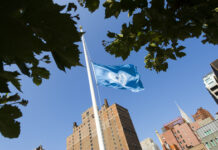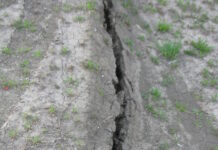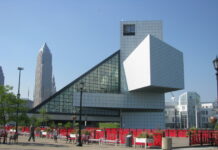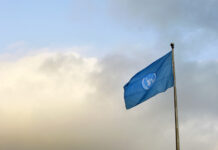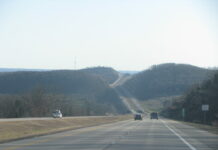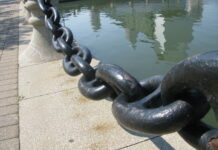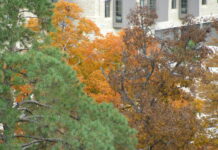Photo credit: DiasporaEngager (www.DiasporaEngager.com).
When he testified before the Congressional Committee on Education & the Workforce on May 23, Rutgers President Jonathan Holloway admitted that there is a problem with antisemitism at Rutgers and that his administration had been too slow to implement necessary changes in response to it.
Yet, in an opinion article in NJ.com on May 22, Rutgers Professor Todd R. Clear wrote, “Rampant antisemitism at Rutgers? In a word, no.”
Professor Clear’s opinion is diametrically opposed to that of many Jews at Rutgers and members of the investigating Committee, which is focusing on antisemitism on campuses including Rutgers.
The recent disruptive tent encampment by pro-Palestinian, anti-Israel protesters on the Rutgers-New Brunswick campus was clearly antisemitic in nature. This opinion was expressed by many members of the Congressional committee, and by the testimony of President Holloway at the hearings.
To avoid violent conflict with students, like what occurred at UCLA and elsewhere, the Rutgers administration negotiated with students to have them withdraw, but not before finals on the New Brunswick campus were cancelled for thousands of Rutgers students.
An agreement, which may be discriminatory and violate Title VI of the Civil Rights Act, was reached behind closed doors, thus avoiding objections from other campus stakeholders including JFAS (Jewish Faculty, Administrators, and Staff), Hillel, Chabad, and the Chancellor’s own advisory committee on antisemitism.
Given that encampments at other universities had turned violent and destructive, it is no wonder that Rutgers administration chose to capitulate to avoid violence. But that’s exactly what they did — capitulate, and give in to the demands of antisemitic and anti-Israel bullies.
Professor Clear wrote that he and over 50 Jewish faculty members at Rutgers urged President Holloway last week “to hold his course — to resist the chorus of voices accusing Rutgers of antisemitism.”
Yet, on May 21, Rutgers JFAS submitted an open letter to President Holloway with 211 signatories, including myself, noting that “since the Hamas massacres of October 7, 2023, campus antisemitism reached historic levels and affected many of us deeply.”
More than 160 Rutgers students signed their own letter to President Holloway with the same message.
The pro-Palestinian protesters against the war in Gaza, which was precipitated by the vicious, dehumanizing Hamas massacre of Oct. 7, chant “Free, Free Palestine,” “From the River to the Sea,” “Divest,” and “Intifada!”
Professor Clear posits that “each of these chants says something about Israel — they say nothing about Jews.”
I and many other Jewish professors at Rutgers strongly disagree.
Let’s take the most egregious of these chants, “From the River to the Sea,” which is explained succinctly in an article entitled “Why ‘Free Palestine from the River to the Sea’ Means Genocide against Jews” published soon after the massacre.
In a video played at the Congressional hearing, students mindlessly repeated this chant, but upon questioning, they admitted they did not know which river and which sea they were talking about.
The area in question includes all of Israel, and the slogan implies that forming a Palestinian state would “eliminate” more than 7 million Jews. Like many other Jews, I find this chant terrorizing — especially since my brother lives in Israel and he would be subject, at least, to expulsion, if not worse, if this chant were realized.
Professor Clear states that such slogans constitute activism, not antisemitism. The participants at the Congressional hearings could not disagree more. The Committee chair, in her closing remarks, chided three university presidents for not doing enough to fight antisemitism on their campuses, not providing sufficient education, and not suspending and expelling offending students in contradiction to their own university policies to protect students and faculty. The university presidents’ permissive stance toward antisemitism likely contributes to increased attacks on Jews and vandalism against Jewish institutions across the US, including at universities like Rutgers.
I suggest that Professor Clear’s view is not representative of the wider Jewish community, including the dwindling numbers of Holocaust survivors, who feel threatened again by the October 7 massacre and rising antisemitism. And, as a reminder, if Hamas retains power in Gaza (which would happen in a ceasefire), Hamas has promised to repeat the October 7 massacre “over and over.”
It’s unfortunate that it may take criticism from Congress to provide for the rights of Jewish students and faculty at public universities. I hope these university presidents take the ongoing Congressional scrutiny seriously, and make their universities safer places where unbiased learning can thrive and truth be spoken without infringing on individual rights. Only then can we have productive dialogue to understand each other better in the university setting and beyond.
Martin Grumet is a Professor of Cell Biology & Neuroscience, Rutgers University, Piscataway NJ.
Source of original article: Martin Grumet / Opinion – Algemeiner.com (www.algemeiner.com).
The content of this article does not necessarily reflect the views or opinion of Global Diaspora News (www.GlobalDiasporaNews.com).
To submit your press release: (https://www.GlobalDiasporaNews.com/pr).
To advertise on Global Diaspora News: (www.GlobalDiasporaNews.com/ads).
Sign up to Global Diaspora News newsletter (https://www.GlobalDiasporaNews.com/newsletter/) to start receiving updates and opportunities directly in your email inbox for free.



